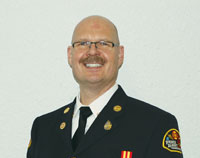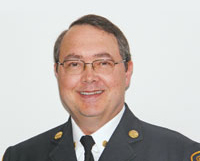
Features
Leadership
Leadership Forum: December 2013
Mistakes: we all make them. Mistakes are part of life and learning from them contributes to our growth.
November 22, 2013
By Les Karpluk and Lyle Quan
Mistakes: we all make them. Mistakes are part of life and learning from them contributes to our growth.
In his book The Psychology of Winning, first published in 1979, Denis Waitley writes, “Mistakes are painful when they happen, but years later a collection of mistakes is what is called experience.” We, too, have made mistakes and learned from them. Mistakes are steps in our leadership growth and shame on us if we don’t learn from them.
Becoming invisible: As the fire chief, it’s very easy to get locked into the daily grind. Staff demands, emergencies, community issues, public inquiries and the official duties of the job can easily create the impression that the fire chief is not a visible member of the department. We have learned that being visible means taking the time to interact with staff; furthermore, this interaction adds to credibility. Take-away lesson: Interact daily.
On-duty time: Being a fire chief is not a Monday-to-Friday, nine-to-five type of occupation. For a fire chief, the on-duty rotation is very simple: 24/7. Yes, we fully understand that the delegation of duties is necessary in order for one to escape burnout, but theory and reality can be two very different things. Without making excuses, some duties are simply better left to the fire chief. We have often found ourselves staying late or getting to the office early in order to tackle work priorities. The trick is to balance work and life. Admittedly, we have, at times, made the mistake of focusing solely on work and, as you can imagine, the life-work balance has been thrown out of equilibrium. When this happens, something will suffer. Take-away lesson: Balance life and work.
Lead by example: This continues to be a favourite chant for leadership experts and motivational speakers. The mistake we want to identify here is that we are leading by example when we have poor habits, too; for example, displaying our impatience with a staff member, losing our cool or generally not demonstrating a positive attitude. Leading by example should not be a paradox. Take-away lesson: Be a positive force in the world.
It’s all about the team: In The Five Dysfunctions of a Team: A Leadership Fable, Patrick Lencioni wrote, “Great teams do not hold back with one another. They are unafraid to air their dirty laundry. They admit their mistakes, their weaknesses, and their concerns without fear of reprisal.” This book is a very good read because it demonstrates how teams cannot function without being a supportive and trusting entity. Many of us have thought at times that if our staff members were unwilling to work with us, then we could go it alone. Wrong. Without a supportive team to help you when the going gets rough, you are in for a terrible fall and no one will be there to catch you. Take-away lesson: In numbers comes greatness; it’s all about building teams and supporting them.
The 18th-century political activist and author Thomas Paine once wrote, “What we obtain too cheap, we esteem too lightly; it is dearness only that gives everything its value.” In other words, if everything comes too easily to us, we will not hold those things in high esteem. Learning from our mistakes may be painful, but it is the memory of that pain that makes us step back and think about what we have done and whether or not we can improve on it.
Wouldn’t it be nice if we could learn from others’ mistakes? However, we often think that we can do it better, until we make that same mistake. Only then do we realize that we aren’t always smarter than the last guy and that we could have learned something from the mistakes made by those who came before us. Never underestimate the value of listening to what others have to share about the bumps and bruises they suffered while climbing the ladder of success.
So, our life lesson for today is to learn from the mistakes that you will undoubtedly make. Since you care about the organization, you will try to make it better and, while on that journey, you are bound to make mistakes. We want to leave you with this final quote by motivational speaker Zig Ziglar: “It’s not how far you fall, but how high you bounce that counts.” To us, this sums up the true leader: someone who understands that he or she will make mistakes. It’s what you do about those mistakes that counts.

|
|
 |
Les Karpluk is the fire chief of the Prince Albert Fire Department in Saskatchewan.
Lyle Quan is the fire chief of Waterloo Fire Rescue in Ontario. Both are
graduates of the Lakeland College Bachelor of Business in Emergency
Services program and Dalhousie University’s Fire Service Leadership and
Administration program. Contact Les at l.karpluk@sasktel.net and follow
him on twitter at @GenesisLes. Contact Lyle at lyle.quan@waterloo.ca and
follow him on twitter at @LyleQuan.
Print this page